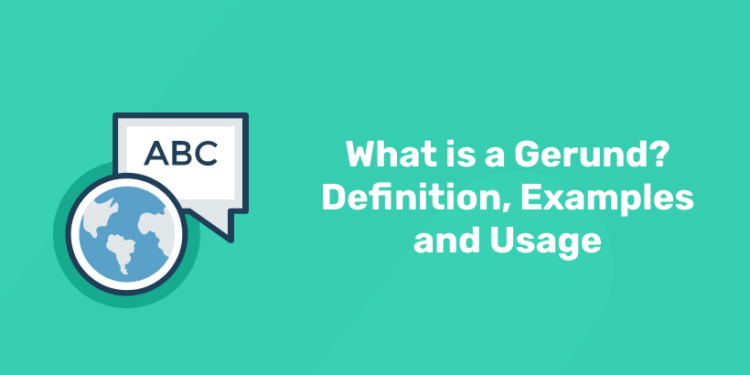Table of Contents
English language learning requires a lot of effort from the learners. Learning the best strategies can help you to improve your spoken and written English skills. English grammar forms an inevitable part of language learning. The verb is an action word which has different forms. One of the major forms of the verb goes with the name gerund. In this article, let’s learn in detail about gerunds, their definition and their usage.
Gerunds in English
What is a Gerund? Gerund is often used in a sentence with an -ing form. The actions or the reason for an incident can be referred to easily with the help of a Gerund which makes it flexible. A Gerund is a form of verb or is made of adding -ing. It can be used in a sentence easily and can act as a noun at times. Gerunds can appear in different parts of the same sentence.
The tense, voice and quality of an object can be understood by looking at the nature of the gerund. The verbal features can be deciphered with the help of gerund. Gerund can also be considered as a noun which appears in the form of a verb, especially as the present participle form with an addition of -ing. Gerund can also signify the state, action or progress of a noun. The gerunds end with -ing. In English, the verb can be transformed into Gerund.
Learn Spoken English with Expert Mentors! Enroll Here!
Features of Gerunds
Here are the major features of gerunds. Let’s see how gerunds can make difference to a sentence.
- Gerund in English is one of the forms of the verb.
- Gerund can be formed by adding -ing to the base verb
- A base verb can be changed to a gerund
- Gerund can always function as a noun or in other words, it can be used as a noun
- It can be otherwise termed as the mixture of noun and verb
- Seemingly a gerund can be a verb but the action of the gerund states it as a noun
- Gerunds are always regarded as third-person singular nouns
- Gerund in English can be defined as a phrase which comprises the gerund part followed by its objects and modifiers.
- Gerunds can also be modified as adverbs in a sentence
- A Gerund phrase can be regarded as a noun in sentences
- It is quite easy to transform verbs into Gerund. It can be achieved by adding -ing or present participle at the verb’s base form.
- If the verb ends in e, it is advisable to drop the final -e in the verb and add -ing instead to make a gerund. For instance, the gerund of take is taking and the joke is joking. The gerund form is achieved after eliminating the final -e
- According to the rule, if the verb ends in -ee, add -ing in addition to the ending as in the case of see where the gerund form of the verb is seeing. Other examples include fleeing, freeing, foreseeing etc
- In other cases, when the verb ends in -ie, make sure to replace the final letter with -y and add -ing after that. For instance, tying, dying, vying, lying, untying etc
Learn Spoken English with Expert Mentors! Enroll Here!
- Furthermore, in the case of the present participle, the final consonant must be doubled to form the gerund. As in the case of run, the final consonant is -n and it needs to be doubled to form the gerund. The gerund of the run is running.
- If the verb ends in -y or -w as consonants, the above-mentioned rule is not applicable. For instance, playing, buying, meowing etc
- The monosyllabic verbs always end with the consonant-vowel-consonant format, the final consonant shall be doubled along with adding -ing form. For example, hitting, putting, blurring, cutting, betting, spinning, drumming etc
- The longer vowels end in consonant-vowel-consonant format. If the last syllable is stressed in such verbs, mam is sure to double the final consonant.
- For instance, in the case of omit, the final consonant -t is stressed and the resultant gerund is omitted. When the final consonant is unstressed as in the case of visit, the gerund visiting is formed without the duplication of the final syllable.
In a sentence, a gerund can be used as a direct or indirect object or a subject. Gerund in either way acts as a noun in the sentence. The gerund can also act as a Prepositions object in a sentence. The continuous tense can be signalled by the presence of a gerund in a sentence. Gerund phrases can be the subject, modifier or object in a sentence. There is a difference between a gerund acting as a noun in a sentence and the ordinary continuous form of the verb.
To make it, even more, clearer, let’s take the example of the sentence ” Radha is playing outside”.
The verb in the sentence can act as present continuous tense. But look at another sentence, Playing every day can improve vitality. In this sentence, playing acts as a noun and thereby falls under the category of the gerund. “Playing” can also be regarded as the subject of the sentence.
List of Gerunds
Here is the list of commonly used gerunds in English
- Cooking
- Baking
- Having
- Dancing
- Playing
- Skimming
- Scanning
- Screaming
- Cooling
- Fooling
- Singing
- Meditating
- Warning
- Betting
- Sitting
Learn Spoken English with Expert Mentors! Enroll Here!
Gerunds in Sentences
- Baking is the most passionate hobby that one can end up with.
- Meera loves reading comic books every day
- It seems like hunting cheetahs is a real struggle
- She loves playing with pets after returning home
- Wilts love playing baseball in the evening
- Dieting can help you to maintain a healthy mentality and physique at the same time.
- Solving difficult math questions is fun for Meera
- Working like a real heroine can make all the difference
- Making everlasting memories is the best part of life.
- Having nutritious food regularly can help you to grow healthy
- Attaining a healthy life is everyone’s dream.
It’s Exercise Time!
Identify gerunds in the following sentences
- They desperately tried dividing the share of the pizza
- Exercising early in the morning is a part of my daily routine.
- Heera does not like playing hockey every evening
- Smoking cigarettes in school is prohibited
- Baking my favourite cake all by myself is fun
- We look enthusiastic while we spend time talking about the moon and stars.
- Solving problems in life is not an easy task, worth our time.
- Camping on the lakeside is a jovial decision
- Planning to visit Mumbai was a tedious task that we undertook recently
- Dancing to the songs of my favourite musician gives me goosebumps.
Function of Gerunds
Aren’t you curious to know about how gerunds usually work in a sentence? In the same sentence, both the gerund and gerund phrases can be used in different ways. Gerunds can act as a subject complement, subject, direct object, indirect object or the object of prepositions.
Gerund as Noun
Gerund acts as a noun in a sentence. The phrases connected to gerund can also be regarded as gerund phrases. The gerund in a sentence can be the subject or subject complement in a sentence. It is often connected with the helping verb.
Gerund as Object
Gerund can be used as a direct object, indirect object, or object of a preposition in a sentence.
Gerund Vs Participle Phrase
The gerund and participle phrases look alike but are having different functions in a sentence. Gerunds can act as a noun in a sentence whereas participle phrases cannot. Participle phrases are used to form continuous tenses. Participle phrases can even be used as adjectives in a sentence. Don’t get confused between the two terms. Read the article again to grab the most precious knowledge about gerunds in English.
Learn Spoken English with Expert Mentors! Enroll Here!
Are you having a hard time finding the best learning partner you can lean upon? Learning the English language can puzzle you sometimes. But if you are confident enough to tackle the language, your confidence itself can act as the protecting armour.











